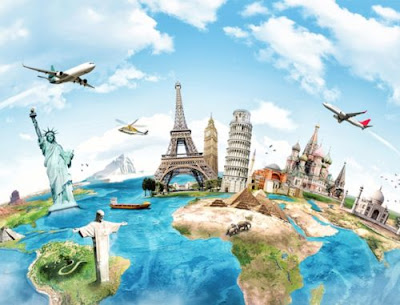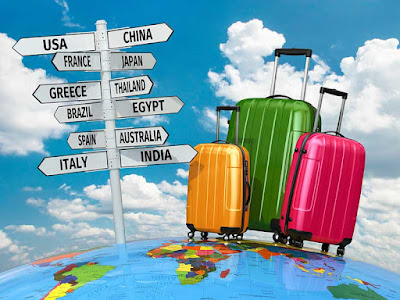Psychological Benefits of Travel: How Exploring New Places Boosts Mental Health
Traveling is not just about discovering new destinations; it’s also a journey of self-discovery. The psychological benefits of travel go beyond the excitement of exploring new places; they have a profound impact on mental health. In this article, we’ll explore how traveling can boost mental well-being and provide numerous psychological benefits.
The Connection Between Travel and Mental Health
Travel has been an integral part of human culture for centuries. It’s not merely a leisure activity but also a means of expanding one’s horizons and nurturing mental well-being. Here are some ways in which travel positively affects mental health:
1. Reducing Stress and Anxiety
Traveling allows individuals to escape from their daily routines and immerse themselves in new experiences. The change of scenery and escape from the demands of everyday life can significantly reduce stress and anxiety levels. It offers a mental break, providing an opportunity to relax and unwind.
2. Enhancing Creativity
Exploring new places, cultures, and environments stimulates creativity. It encourages individuals to think outside their comfort zones, fosters new perspectives, and inspires fresh ideas. This can lead to enhanced problem-solving skills and increased creativity in various aspects of life.
3. Boosting Happiness
Traveling often brings a sense of excitement and adventure. The anticipation of a trip, the experiences during the journey, and the memories afterward contribute to increased happiness. Travel provides moments of joy and excitement that can elevate mood and overall well-being.
4. Building Resilience
Traveling sometimes involves facing challenges such as navigating unfamiliar places, overcoming language barriers, or adapting to unforeseen circumstances. These experiences can build resilience and problem-solving abilities, which are valuable for maintaining mental strength.
5. Promoting Mindfulness
Traveling encourages mindfulness by requiring individuals to be fully present in the moment. Experiencing new cultures, landscapes, and cuisines engages the senses, fostering a heightened awareness of the present. This mindfulness can help reduce ruminative thinking and enhance mental clarity.
6. Strengthening Relationships
Traveling with loved ones or forming new connections with fellow travelers can strengthen relationships. Shared experiences, challenges, and adventures create lasting bonds, enhancing social connections and contributing to emotional well-being.
Specific Psychological Benefits of Travel
1. Escapism and Stress Reduction
Travel provides an escape from the daily grind, allowing individuals to leave behind their stressors and focus on relaxation. It’s an opportunity to unwind, reduce the stress hormone cortisol, and recharge both physically and mentally.
2. Confidence and Self-Esteem
Navigating new destinations, interacting with people from different cultures, and managing unforeseen challenges can boost one’s self-confidence and self-esteem. Travelers often gain a sense of accomplishment and independence.
3. Perspective and Gratitude
Experiencing different cultures and lifestyles can offer a fresh perspective on one’s own life. Travelers may gain a greater appreciation for their own circumstances and a more profound sense of gratitude.
4. Coping with Depression and Loneliness
For individuals dealing with depression or loneliness, travel can provide a change of scenery and new social interactions. Exploring new places and forming connections with others can alleviate feelings of isolation.
5. Learning and Adaptability
Travel encourages learning, adaptability, and an openness to new experiences. These qualities can be valuable in personal and professional life, leading to enhanced mental agility and adaptability.
6. Solitude and Self-Reflection
Traveling solo or spending time alone while exploring new places can foster self-reflection. It provides an opportunity to disconnect from external distractions, evaluate one’s life, and gain clarity on personal goals and values.
The Importance of Travel Planning
Effective travel planning can maximize the psychological benefits of a trip. Here are some tips for planning a mentally enriching journey:
Set Realistic Goals: Define the purpose of your trip and what you hope to achieve. Whether it’s relaxation, adventure, or self-discovery, having clear goals can enhance your experience.
Embrace the Unknown: Be open to spontaneity and unpredictability. Some of the most valuable travel experiences come from the unexpected.
Mindful Travel: Practice mindfulness by fully immersing yourself in each moment. Engage your senses, savor the flavors, and appreciate the beauty of your surroundings.
Balance Activity and Rest: Don’t over-schedule your trip. Allow time for relaxation, reflection, and simply being in the moment.
Interact with Locals: Engage with local communities and learn about their way of life. These interactions can provide a deeper understanding of the destination and its culture.
Maintain a Travel Journal: Keeping a travel journal allows you to reflect on your experiences, emotions, and insights during the journey. It can be a valuable tool for self-discovery.
Cultivating Mindful Travel
Mindful travel is a way of exploring new places while staying fully present in the moment. It encourages a deep connection with your surroundings and a heightened awareness of your experiences. Here are some tips for practicing mindful travel:
1. Disconnect from Technology: While it’s essential to stay connected during your journey, consider setting aside specific times to disconnect from digital devices. By reducing screen time, you can better engage with your surroundings.
2. Slow Down: Don’t rush from one attraction to another. Take your time to savor each moment. Whether it’s enjoying a local meal, strolling through a historical site, or watching a scenic sunset, slow down and appreciate the beauty around you.
3. Observe Your Surroundings: Use all your senses to take in the environment. Listen to the sounds of the city, feel the textures of the landscapes, and savor the flavors of local cuisine. Observing your surroundings mindfully can create a profound connection.
4. Practice Gratitude: Each day, reflect on the experiences you’ve had and the people you’ve met. Express gratitude for the opportunities and insights gained during your journey.
5. Immerse in Local Culture: Engage with the local culture by learning a few basic phrases of the local language, trying traditional foods, and participating in local customs and traditions. These interactions can provide a deeper and more meaningful travel experience.
6. Capture Memories Mindfully: When taking photos, do so with intention. Instead of snapping countless shots, carefully frame your pictures to capture the essence of your experience. This approach can help you relive the moments more vividly when you revisit your memories.
The Healing Power of Nature Travel
Traveling to natural destinations offers unique therapeutic benefits for mental health. Nature travel, sometimes referred to as ecotherapy or nature therapy, encourages a connection with the natural world and provides profound psychological benefits:
1. Stress Reduction: Spending time in nature has been proven to reduce stress and lower cortisol levels. The tranquility and beauty of natural landscapes provide a sense of calm and relaxation.
2. Mental Clarity: Nature travel offers the opportunity to disconnect from the constant stimulation of modern life. This break allows for mental clarity, helping to reduce the mental clutter and promote emotional balance.
3. Mindful Presence: Natural environments naturally encourage mindfulness. The beauty of nature, from a serene forest to a breathtaking mountain range, can captivate your senses and bring you into the present moment.
4. Connection with Earth: Many people find solace and connection with the earth when they travel to natural destinations. The grounding energy of the earth can have a stabilizing and calming effect on mental health.
5. Physical Activity: Nature travel often involves physical activities like hiking, swimming, or exploring, which promote physical fitness and the release of endorphins, further enhancing mental well-being.
Responsible and Sustainable Travel
Responsible and sustainable travel is also an important aspect of mindful travel. As travelers, we have the responsibility to protect the environment and respect local cultures. Practicing ethical travel not only benefits the destinations you visit but also contributes to your own sense of well-being. Here are some key principles of responsible travel:
Minimize Environmental Impact: Choose eco-friendly accommodations, reduce waste, and support businesses that prioritize sustainability.
Respect Local Cultures: Learn about and respect the local customs, traditions, and etiquettes of the destinations you visit. Be a responsible and respectful guest.
Support Local Communities: Contribute to the local economy by buying locally made products and supporting small businesses. Consider volunteering or engaging in community-based tourism activities.
Reduce Plastic Usage: Minimize the use of single-use plastics by carrying reusable water bottles, shopping bags, and utensils. This reduces environmental impact and supports clean and healthy destinations.
Leave No Trace: Follow the Leave No Trace principles, which include packing out all waste, respecting wildlife, and preserving natural landscapes.
Conclusion
The psychological benefits of travel are a testament to the transformative power of exploration and adventure. Traveling provides an escape from the ordinary, promotes relaxation, encourages mindfulness, and enhances overall well-being. Whether you’re traversing bustling city streets or wandering through serene natural landscapes, travel can be a journey of self-discovery and mental enrichment.
As you embark on your next adventure, consider incorporating mindful travel practices and embracing the healing power of nature. Engage fully with your experiences, nurture gratitude, and connect with the world around you. Through responsible and sustainable travel, you can contribute to the well-being of the planet and its inhabitants, while also reaping the psychological rewards of your journeys.
So, where will your next mindful travel adventure take you?
How does travel benefit mental health?
Travel can reduce stress and anxiety, enhance creativity, boost happiness, build resilience, promote mindfulness, strengthen relationships, and provide opportunities for self-reflection.
Can travel help with depression and loneliness?
Travel can provide a change of scenery and new social interactions, making it beneficial for individuals dealing with depression or loneliness.
What are the psychological benefits of traveling solo?
Traveling solo can boost self-confidence, self-esteem, adaptability, and independence. It also provides an opportunity for solitude and self-reflection.
How can travel planning enhance the psychological benefits of a trip?
Effective travel planning, including setting realistic goals, embracing spontaneity, practicing mindfulness, balancing activity and rest, interacting with locals, and maintaining a travel journal, can maximize the psychological benefits of travel.
How does travel benefit mental health?
Travel can reduce stress and anxiety, enhance creativity, boost happiness, build resilience, promote mindfulness, strengthen relationships, and provide opportunities for self-reflection.
Can travel help with depression and loneliness?
Travel can provide a change of scenery and new social interactions, making it beneficial for individuals dealing with depression or loneliness.
What are the psychological benefits of traveling solo?
Traveling solo can boost self-confidence, self-esteem, adaptability, and independence. It also provides an opportunity for solitude and self-reflection.




